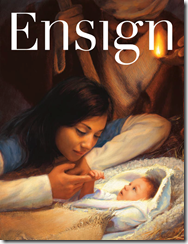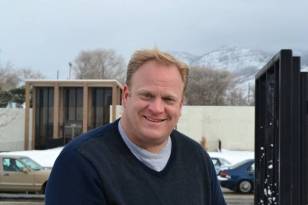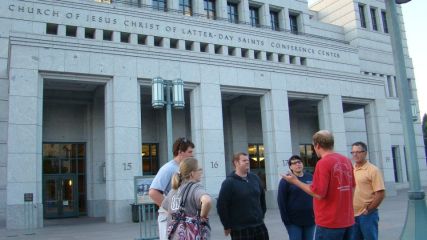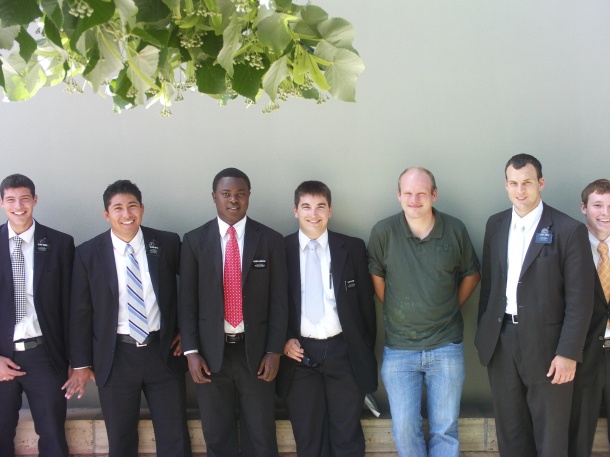The mists of time lend one a certain romance, Alan Bennett
Its that time of year again. Folk are getting excited about the season, buying and wrapping gifts, some have already got a carol service or two under their belt, along with some mince pies perhaps, and there is a general sense of good will in the air. Mormons are no different in this respect. The December Ensign touches on the great themes of Christmas, the birth of a son, the story of shepherds and angels, the visit of kings. Mormons like to think of themselves as just like everyone else at this festive season.
At the same time, the traditional message of Mormonism is one of distinctions, things that set Mormons apart. Think of the founding claims of Mormonism; other churches are corrupt and wrong, Mormonism is “the only true church,” Mormons have the only true gospel, restored to earth after 1900 years of darkness and apostasy.
How do Mormons hold these conflicting ideas at the same time? How can they be like other Christians and yet so distinct as to be “the only true church?” When we read the items in the Ensign the discerning among us will easily identify the distinguishing marks of Mormonism.
Happiness a Spiritual Fruit?
The Bible message is of God come to dwell among men to serve and, ultimately, to die for men’s sins, then rise again, breaking the bonds of death and inviting all who would to come to God by grace, through faith in Christ (Romans 10:9-13; Hebrews 4:14-16)
The Mormon message is of the Son of God come to dwell among men, to inform and educate people in the “great plan of happiness” God the Father has devised for us. Mormon “salvation” is no more than resurrection, while what Christians understand to be salvation, eternal life in the kingdom of God, Mormons call exaltation and it is earned.
 Henry B Eyring states, “You have felt happiness as you have kept the commandments of God. That is the promised fruit of living the gospel (see Mosiah 2:41)” The first presidency message (p4) mentions happiness no fewer than 13 times in an article just 656 words long. Happiness is the great theme of Mormonism, the gift Mormons bring their neighbours, but where does the Bible say Christ died to educate us in the art of happiness?
Henry B Eyring states, “You have felt happiness as you have kept the commandments of God. That is the promised fruit of living the gospel (see Mosiah 2:41)” The first presidency message (p4) mentions happiness no fewer than 13 times in an article just 656 words long. Happiness is the great theme of Mormonism, the gift Mormons bring their neighbours, but where does the Bible say Christ died to educate us in the art of happiness?
The Bible clearly teaches that “the fruit of the Spirit is love, joy, peace, patience, kindness, faithfulness, gentleness, self-control…” (Galatians 5:22-23) Something as trite and temporary as happiness is not found here. Note also that those things that Mormons would regard as the root of their happiness, those acts of obedience demonstrated in kindness, faithfulness etc. are not roots at all but they are fruit of an abiding in Christ, as explained in Jesus’ description of the vine and the branches in John 15.
God and Son
But isn’t Jesus “the Son of God” as Mormons say? Another distinction is discovered in the visiting teaching message p7, The Divine Mission of Jesus Christ: The Only Begotten Son. Here we learn that the only thing that distinguishes Jesus from the rest of mankind is not his position as the second member of the Christian godhead but because he was born of God the Father and a human mother.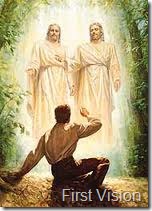
In Mormonism all mankind is literally born of God in a premortal existence and God is as much our Father as he is Jesus’ Father, Jesus himself being our elder brother by premortal birth. In this familiar picture of Joseph Smith’s “First Vision” you are effectively seeing a father and two sons. That being so, Mary was also a daughter of God in that premortal existence, which means that for Jesus to be born on earth of a Divine Father and mortal mother the Mormon God would have to have had an incestuous relationship with Mary. Mormon leaders have asserted as much:
“The Only begotten of the Father (Moses 5:9) ‘These name titles all signify that our Lord is the Only Son of the Father in the flesh. Each of the words is to be understood literally. Only mean only; Begotten means begotten; and Son means son. Christ was begotten by an Immortal Father in the same way that mortal men are begotten by mortal fathers” (Bruce R McConkie, Mormon Doctrine)
“The Saviour was begotten by the Father and his Spirit, by the same Being who is the Father of our spirits, and that is al the organic difference between Jesus and you and me.” (Brigham Young, JOD 4, 218)
Joining the Parade
Then there is an article on becoming Better Saints Through Interfaith Involvement (p28) There are two important points I want to raise here. Mormonism is founded on the claim that all churches are wrong and all those who profess the Christian message of the past two thousand years are corrupt (JSH 1:19) That message is being taken to your neighbours as you read this, make no mistake. John Taylor, third Mormon president said of such initiatives:
“We talk about Christianity, but it is a perfect pack of nonsense…Myself and hundreds of the Elders around me have seen its pomp, parade, and glory; and what is it? It is a sounding brass and a tinkling symbol (sic); it is as corrupt as hell; and the Devil could not invent a better engine to spread his work than the Christianity of the nineteenth century.” (JOD 6, 167)
This statement was made in 1893. Exactly 220 years later Mormons find themselves encouraged to join this same parade of pomp and glory.
My second point regards the claim Mormons make that Evangelical Christians “don’t believe in good works.” It is a common enough statement to those who take the trouble to engage with Mormons but it is patently not true. Mormons should know this since it is they who “do good works” alongside other churches that teach a gospel of grace.
They waste no time telling the world how engaged they are with their neighbours of “other faiths,” as they like to call us, and yet they insist we don’t believe in good works. They expect to find us idle even as we work alongside them for the good of the wider community
How do Mormons deal with such cognitive dissonance? To be so conflicted must come at some great cost. They boast they are different yet insist they are like us. They despise our parade and yet they want to join in, bang their drum, and mingle with the crowd. They accuse us of having a cheap grace yet happily work alongside us as we sacrifice ourselves in service to others, all the time boasting of their own works yet failing to recognise ours.
Generations
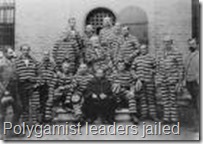 The first thing to realise is that different generations join a different Mormon Church. The Mormons of the 19th century were prepared to go to prison, even to die rather than relinquish their practice of polygamy. Even into the early 20th century Mormon leaders died on the run from the law. A whole package of doctrine supported this faith that polygamy was the order of heaven and no earthly power was going to stop it.
The first thing to realise is that different generations join a different Mormon Church. The Mormons of the 19th century were prepared to go to prison, even to die rather than relinquish their practice of polygamy. Even into the early 20th century Mormon leaders died on the run from the law. A whole package of doctrine supported this faith that polygamy was the order of heaven and no earthly power was going to stop it.
In much of the 20th century, while Mormons no longer practiced polygamy outside their temples, that package of doctrine was till taught and clearly understood by Mormons who looked to a future time when it would be restored, perhaps in the millennium. I remember well and taught enthusiastically all that Mormonism had taught about this “celestial doctrine.”
In the last days of the 20th century and into this 21st century Mormons regard polygamy as an historical curiosity, something of its time but certainly of no great doctrinal significance for them. You will hear Mormons dismiss it and say they don’t even fully understand the whole business other than as something that happened a long time ago. The same might be said, need I remind you, of the Mormon doctrine of denying Black people the priesthood until July 1978.
The second point is demonstrated by another article on page 54, a report about sermons from early church leaders recovered because transcribed from the shorthand in which they were originally recorded. You might expect the Mormon Church to shy away from publishing such potentially incriminating material since the Mormonism of those far distant days is very different from the Mormonism of 2013/14.
But there is something about the passing of time that lends a certain romance to the good bits of history and something of irrelevance to the bad. The Mormon Church plays on this helpful illusion that time lends to just about anyone’s story.
The mists of time allow them to say they don’t really know what was meant so long ago and in such circumstances. Scott Gordon said something like this, as reported in Bobby’s blog post last week. In such ways the different generations of Mormonism are built up, given a new, contextual meaning where once their meaning was timeless.
Where we see Mormons conflicted Mormons refuse to see such conflict. The Mormon Church helps by continually rewriting their history and urging Mormons to think only of what is in front of them, their generation’s story. It depends on where in this web of lies you are but each generation has found comfort in its own untruths. I was thinking of the words of the song Windmills of Your Mind –
Like a tunnel that you follow
To a tunnel of its own
Down a hollow to a cavern
Where the sun has never shone
We can’t assume the Mormon standing in front of us has traversed any particular tunnel or is familiar with the particular dark cavern we first encountered Mormonism. Each will have their own set of ideas, their own understanding to reassure them and it is these, as much as anything, we must first deal with.
What is certain is that the Son has not shone in their lives and it is the message of grace, of the cross that is always our destination as we witness; that never changes. This Christmas lets remember the child in a manger born to die on a cruel cross for the sins of the world, including Mormons who, despite their protestations to the contrary, have yet to know him.
There are, then, many avenues I could choose to go down in examining the remarkable claims made about the character and life of Joseph Smith in this chapter. I will begin with this quote: “God had called him to deliver the poor and honest-hearted of all nations from their spiritual and temporal thralldom [bondage].” For a couple of reasons, such a statement goes to the heart of Mormonism. Firstly, there is the clear suggestion that, until the ‘calling’ of Joseph Smith to the role God had supposedly assigned him, people were labouring in spiritual bondage (i.e. there was a need for a ‘restoration’ of truth). This implies that there was a need for the teachings of Joseph Smith because what Christian believers had been thus far treating as gospel was somehow insufficient or false. Secondly, I would suggest that this quotation is verging on blasphemy since it is suggesting that God chose Joseph Smith to ‘deliver’ or ‘save’ people from spiritual bondage. I think that we all know that this was the mission of Jesus, not Joseph Smith!
The second statement which struck me as I read through this chapter was this, “As I looked upon him [that first time] and listened, I thought to myself that a man bearing such a wonderful testimony as he did, and having such a countenance as he possessed, could hardly be a false prophet”. It seems quite telling to me that whoever has compiled and authorised the content of this teaching manual has decided that this comment from Lorenzo Snow is worthy of inclusion. I say this because the above quote shows that Lorenzo Snow decided that Joseph Smith must have been who he said he was on the basis of his having a ‘wonderful testimony’ and a ‘countenance’ that left an impression on him. This is very much in line with the LDS way of establishing truth, namely impressions or feelings that what they are hearing is right, rather than checking if what is being taught is in line with the Jesus of the Bible.
In the following section, some very bold comments are made regarding the character of Joseph Smith. Here is a flavour of that: “There never was a man that possessed a higher degree of integrity and more devotedness to the interest of mankind than the Prophet Joseph Smith. I knew Joseph Smith to be an honest man, a man of truth, honor and fidelity, willing to sacrifice everything he possessed, even life itself, as a testimony to the heavens and the world that he had borne the truth to the human family.” Why the need to create such an outstanding impression of Joseph Smith’s integrity? Any student of the Bible can tell you that God often chose people with major flaws in their character. One need only look at the lives of people such as David and Moses, as well as the people Jesus drew to him, to know that God doesn’t call the people who have already proved that they are ‘worthy’. Besides, the claims made here about Joseph Smith’s character stand in direct opposition to many of the things known about him. Mormon apologists will even acknowledge these flaws as a sign that Joseph Smith was only human after all. So why the bold claims made officially here? They do not stand up. Here are some reasons why I say this.
- Joseph Smith ‘married’ himself to the wives of other men, as well as to very young girls.
- He publicly lied about practising polygamy. “What a thing it is for a man to be accused of committing adultery, and having seven wives, when I can only find one. I am the same man, and as innocent as I was fourteen years ago; and I can prove them all perjerurs.”
- Joseph Smith also claimed to have done more than Jesus ever did in terms of holding a group of followers together: “I have more to boast of than ever any man had. I am the only man that has ever been able to keep a whole church together since the days of Adam. A large majority of the whole have stood by me. Neither Paul, John, Peter, nor Jesus ever did it. I boast that no man ever did such a work as I. The followers of Jesus ran away from Him; but the Latter-day Saints never ran away from me yet.”
- Joseph Smith claimed that he had translated some Egyptian papyri that contained writings by Abraham’s own hand into English, when in fact they were not even from the same era as Abraham and were later discredited by all the Egyptologists who looked at the work.
- When the truth was published that Joseph Smith had been claiming to his followers that he had received a revelation that contained a doctrine of plural marriage in the ‘Nauvoo Expositor’, Joseph Smith’s response was to have the publication’s printing press destroyed, ultimately leading to Smith’s imprisonment and eventual killing.
I contend that these actions are not those of a man with the highest degree of integrity and devotedness to the interest of mankind.
Much is made in this chapter of how people felt in the presence of Joseph Smith. For example: “never yet have I met another person in whose company I felt the peculiar and powerful influence that I felt while in the presence of the Prophet Joseph Smith. It was due to the great portion of the Spirit of God that he possessed, merely the shake of his hand would cause a person to become filled with this influence, and any sensitive nature would know that he was shaking the hand of an extraordinary person.” Why such attention on one individual? The whole chapter is concerned with the building up of the image of Joseph Smith and not with drawing people towards their Saviour. Mormons do claim to be Christians after all (and actually the only fully authentic ones at that!)
If the point was not already made clearly enough, then the sub-heading to the final section of the chapter sums it up: “Each of us can gain a testimony that Joseph Smith was a prophet and that the gospel was restored through him.” If the LDS church is Christian, then surely a devotion and submission to Jesus as Lord and Saviour is what counts. The idea of then also ‘gaining a testimony that Joseph Smith was a prophet’ seems utterly superfluous. What would be the need for a true and devoted follower of Christ to gain such a testimony? This could not add anything to knowing, and being known by, the Lord. Do I need to gain a testimony that Isaiah was a true prophet? Do I need to gain a testimony that God spoke to Moses? Certainly, the Mormon missionaries would not expect you to, so why is this then the case for Joseph Smith?
The chapter continues and expands on what this testimony actually means: “What is the nature of our testimony? It is this: That this is the dispensation of the fulness of times; that the angel that John the Revelator saw flying through the midst of heaven having the everlasting Gospel to preach unto them that dwell on the earth, and to every nation, and kindred and tongue and people—that that angel has made his appearance and restored the Gospel to the earth, Joseph Smith being the instrument through which the restoration was effected” Yet any close examination of the gospel contained in the New Testament alongside the ‘gospel’ of Mormonism will conclude that we are looking at two different sets of teachings. There is one which frees people from the consequences of sin through Jesus’ suffering and death on the cross, and the other which demands unfailing compliance with a religious structure and system that leaves the grace of Jesus out of the picture.
The chapter closes by emphasising the importance of having an ‘individual knowledge’ of Joseph Smith being a true prophet. Again, we see that what is crucial throughout this chapter is, sadly, an acceptance of the claims that Joseph Smith made about himself, rather than an understanding and acceptance of Jesus as Lord and Saviour. For Mormons, the focus of attention and faith is in the actions of Joseph Smith, not Jesus.

Some of you may remember a while ago we had Ned Scharisbrick from the FairMormon Podcast do an episode responding to some articles on this blog. This was a great chance to have some online communication with Ned. In the process of this he very kindly offered to have me go on his podcast and have some dialogue with him. Ned runs an episode called the 4th watch, looking out for challenges and criticisms of the Mormon faith.
For those who dont know Fair is the Foundation for Apologetics information and Research and is one of the main organizations defending Mormonism from a faithful LDS perspective.
Well this week that episode went online on the Fairblog Podcast. You can find the episode here, or listen on the audio file below.
Bobby on the Fairblog podcast.
I very much appreciated Ned having me on, and I think this was a good example of respectful dialogue. I will let the episode speak for itself rather than offering some commentary on it myself, but we discussed the issue of what does it mean to be saved.
One thing I would say is in the introduction to the episode text it says this:
Mr. Gilpen comes from the evangelical Calvinist tradition of Christianity and the term ‘anti’ may come across as disrespectful to those who are actually kind to members of the LDS Church. The term anti in this discussion is used to represent those who are against or openly opposed to the teachings of the Church of Jesus Christ of Latter-day Saints, much as the term “pro” could be used for those who agree with or openly promote the teachings of the LDS Church.
I appreciate the explanation of what Anti-Mormon means here but I am still sad to see this used, I think it would be much more helpful if those engaged in LDS Apologetics start to publically state the difference between those that are LDS Critics and Anti-Mormons. As many Mormons maybe even to this episode will switch off when they see this term. Anti-Mormons in the mind of many Mormons refers to people who are opposed to them as people and are to be avoided, this is by no means what I am, and I think Ned does appreciate this.
However again all of that said I very much appreciate Ned having me on and I look forward to any comments that may come.
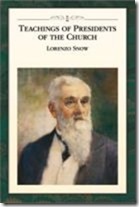
“Cultivate a spirit of charity; be ready to do for others more than you would expect from them if circumstances were reversed.”
Obviously doing good to others is a good and Godly principle. LDS, like main stream Christians seek to follow this biblical principle of Charity and service, loving your neighbour, treating others as you would expect to be treated yourselves. This chapter begins with a story of Lorenzo and his family’s exodus from Norvoo, they helped a man who needed a ride on their wagon and in turn the man (who happened to work in repairing wagons,) repaired the wagon for the family when they were in desperate need. Lorenzo commented that this situation reinforced in him the principle that one favour often leads to another.
the next heading states…
“We are Children of the same Heavenly Father, and we have been sent into the world to do Good.”
Lorenzo speaks here of the LDS belief that everyone on earth is literally brothers and sisters as they were conceived and born in heaven as spirit children of God the Father and his wife. Therefore with this in mind he advocates LDS to treat their kin well, treating them as they would a brother or a sister.
As part of this doing good to others, Lorenzo also calls LDS to share their learning, saying that by “communicating his information while engaging in learning it,” a person can learn all the more. Pursuing education is strongly encouraged within the LDS church.
Seek ye out of the best books words of wisdom, seek learning even by study and also by faith.” -Doctrine and Covenants 109:7
Lorenzo goes on to discuss how we should seek the good of our friends, and sacrificing for the sake of others.
“We see this in the Savior, and in brother Joseph, and we see it in our President ( Brigham Young ). Jesus, brother Joseph and brother Brigham have always been willing to sacrifice all they possess for the good of the people.”
I have to say that I am offended here on behalf of our Savior that Lorenzo would even think to compare anyone to Him. By all means advocate living a sacrificial life, and yes perhaps Joseph Smith and Brigham Young did this to some extent, but I think Jesus is in a league of His own.
I think to some extent Lorenzo puts across the idea that, one favour leads to another in return, to help others does you good, in teaching others you will learn more, by sharing knowledge your, “mind will expand, and that light and knowledge which he (you) had gained would increase and multiply” Sure I agree that their are “treasures in heaven,” like in the story of the servants who are given talents to use wisely, (Matthew 25:14-30), those who do use them wisely will receive a reward. But then we also have the story of the good Samaritan, what was his reward?
To know he had done the will of the Father, and perhaps more in the next life. Did he receive a reward in this life we’ll never know, but I believe he did this good service to his fellow man purely out of a love for and obedience to God.
Quite a short post for me, I think we’re largely in agreement that we should do good to others, as the Bible instructs.
As always I’m happy to receive your feedback
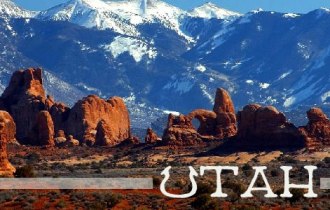
Hey there all. As many who have been reading this blog for a while will know, I have been to Utah on mission trips for 3 years running between 2010 and 2012. These have been seriously some of the best times of my life. I have been on a daily basis actively involved in reaching out to LDS people as well as meeting, training and connecting with various Christians from Utah and other parts of the USA. My main contact is Russ East from Utah Partnerships for Christ.
Russ runs a ministry hosting mission trips from all over America and the world seeking to reach out to the residents of Utah. On every visit I have stayed and worked with Russ, being involved with outreach at Temple Square in Salt Lake City and also the Manti Miracle Pageant, where each night 14,000 Mormons come and watch a re-enactment of their theology and believed history, here is a discussion I had there.
As well as reaching out to Mormons on my last trip I was also involved with training and equipping Christians. Here I am giving some guys a tour of temple square.
During these visits I have also been on Heart of the Matter with Shawn Mccraney twice, here is one of my appearances at the end of this video.
So what is my point in all this? Well I want to go back to Utah, every year from 2014 onwards. In fact my wife Vicky and I are in genuine hope and prayer that one day in the next 5 years or so we want to move to and live in Utah. However these trips are expensive and so this post is an unashamed request, that you would consider supporting me to go to Utah on a mission trip in 2014.
For this trip I plan to:
- Be very active in outreach to LDS people in Utah, particularly at the Manti Miracle Pageant.
- Make contact with local Christian Churches in Utah, seeking to build relationships and raise support for a permanent Utah move.
- Build relationships with Key Christians in Utah already active in evangelism to LDS people.
- Report back to you on what is going on and keeping you up to date in all that you are supporting me to do over there.
This is your chance to have an active impact on LDS people not only in the UK but around the world. Please prayerfully consider supporting me for this trip. Anything you contribute however big or small with be massively significant in helping me to make this trip. I estimate I need to raise around £1000 to go for around two weeks. You can contribute by emailing me on [email protected] for info, You can also give via paypal by clicking here. Or by clicking the paypal button below.
Thank you for reading, more updates on this to follow.
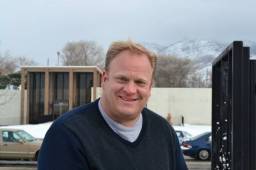
Hi there all as some of you know I recently had a great time having Russ East over from Utah Partnerships for Christ staying in the UK for a few days. While he was here he went on the Radio show Unbelievable? On premier Christian Radio with Justin Brierly.
Recently Hans Mattsson who was in the Europe area presidency for the LDS Church had a crisis of faith, this was so significant it made the New York Times, you can see the article here.
Russ has dialogue on this show with Brian Hales, an LDS scholar who has recently wrote a number of books from a faithful Pro LDS perspective about Joseph Smiths Polygamy. Russ and Brian have dialogue on this show about whether Mattsson’s crisis of faith was a natural response to the information he learned about Joseph Smith, this is really worth a listen.
You can listen from the Unbelievable site here or directly on our page below.
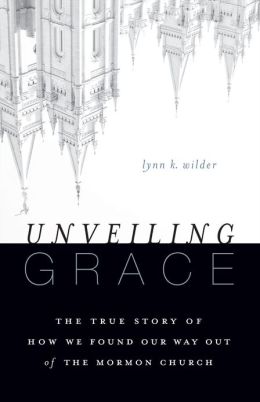
Recently there has been a really excellent book release called Unveiling Grace by Lynn Wilder. Lynn was an LDS member and during some of that time a BYU professor. In many years of reading many books of this kind this is easily one of the best. There is an excellent insight into Utah Mormon life, and the transition and struggles that many go through in leaving Mormonism and coming to Christ. This book is really worth a read. Also below is Lynn and her husband Michael sharing their story.
The book can be bought at Amazon UK and Amazon US as well as in many other bookstores.
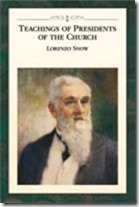
Most of this chapter comprises extracts from a sermon Lorenzo Snow delivered just after he had been called as president of the Quorum of the Twelve in April 1889. That date, that period, is significant because many of the conditions that prevailed some fifty years earlier were again being experienced by the Mormon Church.
In her seminal biography of Joseph Smith, No Man Knows My History, the historian Fawn M Brodie wrote:
“Mormon theology was never burdened with otherworldliness…Wealth and power [Mormons] considered basic among the blessing both of earth and of heaven…” (No Man Knows My History, 1966 ed. pub. Alfred A Knopf, p.p. 187/8)
A quote from an 1831 letter throws light on the Saints’ view of wealth and entitlement:
“It passes for a current fact that there are immense treasures in the earth, especially in those places in the State of New York from whence many of the Mormonites emigrated last spring; and when they become sufficiently purified, these treasures are to be poured into the lap of their church; to use their own language, they are to be the richest people in the world.” (Ezra Booth, letter written late in 1831. Quoted in Brodie p. 187)
This understanding has bearing on the subject of Snow’s sermon. Here are the salient facts surrounding both periods, 1835 and 1889:
By 1835 Joseph Smith had built his own little kingdom in Kirtland
By 1877, the time of his death, Brigham Young had built a kingdom in the Salt Lake Valley
In 1835 rumours of polygamy were causing problems for the church and Joseph Smith was forced to deny the rumours, even though his denial was a palpable lie.
In 1887 the Edmunds-Tucker Act allowed the government to effectively dissolve the Mormon Church as a legal entity because of the practice of polygamy and, in 1890, it was this that forced the hand of church president Wilford Woodruff who issued the Manifesto abandoning polygamy.
In 1835 a new temple had been completed and had drained church resources
By 1890 the Salt Lake temple was completed and had drained church resources
So, what did the Saints do in 1835 to solve their financial problems? What caused Lorenzo Snow to refer to an apostasy?
Land-Grabs and Dodgy Banking
in the mid 1830’s Mormons entered a period of frenzied land speculation led by Joseph Smith himself. In other words, if there was an apostasy, Joseph was chief heretic. There was a huge influx of immigration that caused the population in and around Kirtland to jump 62 percent and the question of where they would all live had dollar signs spinning in the eyes of those able to buy and sell property.
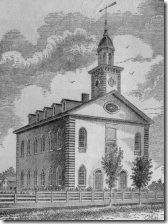 In Kirtland, lots jumped from $50 to $2,000, and surrounding farms from $10 and $15 an acre to $150. Joseph began buying and selling land with the rest. His credit, backed by the collateral of the new temple built for some $70,000, was good so he borrowed, speculated to accumulate. Along with three others, he began a frenzy of borrowing and purchasing, hoping to make riches from the incoming Mormon population. Of course, this created a property bubble that couldn’t last but that didn’t seem to trouble the prophet.
In Kirtland, lots jumped from $50 to $2,000, and surrounding farms from $10 and $15 an acre to $150. Joseph began buying and selling land with the rest. His credit, backed by the collateral of the new temple built for some $70,000, was good so he borrowed, speculated to accumulate. Along with three others, he began a frenzy of borrowing and purchasing, hoping to make riches from the incoming Mormon population. Of course, this created a property bubble that couldn’t last but that didn’t seem to trouble the prophet.
Mormon apostle, Parley P Pratt was so concerned he wrote a letter to Joseph Smith in which he declared himself, “…fully convinced that you, and president Rigdon, both by precept and example, have been the principle means in leading this people astray, in these particulars, and having myself been led astray and caught in the same snare by your example, and by false prophesying and preaching, from your own mouths, yea, having done many things wrong and plunged myself and family, and others, well nigh into destruction, I have awoke to an awful sense of my situation, and now resolve to retrace my steps and get out of the snare, and make restitution as far as I can.” (quoted in Tanner, Mormonism-Shadow or Reality, p.528)
The level and extent of speculation was so damaging it depreciated paper money going into the United States Treasury. On July 11, 1836 Andrew Jackson issued a specie circular, forbidding agents to accept anything but gold and silver for the sale of public land (specie is a term for money in the form of coins and paper)
According to the History of the Church, Joseph Smith had marked September 11, 1836 as the day God would redeem Zion. Quoting in part Isaiah, he said, “Then, for brass the Lord will bring gold, and for iron silver, and for wood brass…and then the land will be worth possessing and the world fit to live in.” Unfortunately, the prospect facing the Saints was bleak, and they faced being driven out of Missouri as those who once were pleased to shelter them now lost all sympathy for them.
Buried Treasure
Money had to be gained from somewhere, but the specie ban made it very difficult. It was then that news of buried treasure reached Joseph, first in the form of a story in the Painesville Telegraph.
War treasure was said to be buried beneath a house in Salem, Massachusetts, and a convert named Burgess claimed he was the only one who remembered its exact location. I know what your thinking; he surely isn’t going to fall for this. Well, the pull of the old days was just too strong, the promise of buried treasure too tempting, and he arrived in Salem early in August, 1836.
Joseph’s true objective could not be revealed and in this he faced a dilemma. His initial explanation was that this was a mission tour. The truth had to come out at some time however and, as so often before, he solved his problem by receiving a revelation, Doctrine & Covenants 111 which begins:
“I, the Lord your God, am not displeased with your coming this journey, notwithstanding your follies. I have much treasure in this city for you, for the benefit of Zion, and many people in this city, whom I will gather out in due time for the benefit of Zion, through your instrumentality.
Therefore, it is expedient that you should form acquaintance with men in this city, as you shall be led, and as it shall be given you. And it shall come to pass in due time that I will give this city into your hands, that you shall have power over it, insomuch that they shall not discover your secret parts; and its wealth pertaining to gold and silver shall be yours. Concern not yourselves about your debts, for I will give you power to pay them.” (v.v 1-5)
Mormons today who get their Mormon history only from official sources will know nothing of Joseph’s true motives, of the Saints’ true financial and moral dilemma. The heading for section 111 disingenuously reads:
“Revelation given through Joseph Smith the Prophet, at Salem, Massachusetts, August 6, 1836. At this time the leaders of the Church were heavily in debt due to their labors (sic) in the ministry. Hearing that a large amount of money would be available to them in Salem, the Prophet, Sidney Rigdon, Hyrum Smith, and Oliver Cowdery traveled (sic) there from Kirtland, Ohio, to investigate this claim, along with preaching the gospel. The brethren transacted several items of Church business and did some preaching. When it became apparent that no money was to be forthcoming, they returned to Kirtland. Several of the factors prominent in the background are reflected in the wording of this revelation.”
They were not, however, “in debt due their labours in the ministry,” they were in debt because of wild and unsustainable land and property speculations, Joseph leading the charge.
It had been ten years since he had dug for buried gold but he hadn’t left behind his simple faith in the folklore and blind superstitions that had led to his early treasure-seeking adventures in the first place. Unfortunately for him, Burgess soon abandoned this venture, claiming the city had changed so much he could no longer be sure of the treasure’s location. The biter bit? It would seem so, since Joseph had fallen victim to the same scam he had pulled on others and, like them, he walked away without the gold in which he so believed and on which he had so depended to get him out of his dilemma.
Dodgy Banking
Joseph Smith didn’t come back entirely empty-handed, having negotiated more loans from companies in the East. However, he couldn’t go on living indefinitely on borrowed funds. At some point, he knew, his debts had to be liquidated and the Saints’ finances established on a more sure footing. It was now, and in the same spirit of wild speculation, that Joseph Smith established his own bank, the Kirtland Safety Society Bank Company. This wasn’t unusual at the time; the rapid expansion of the West created a demand for money that wasn’t being met by existing banking institutions.
Again, Joseph legitimised this new venture with a new revelation. The Saints were assured that Smith’s bank would “grow and flourish, and spread from the rivers to the ends of the earth, and survive when all others should be laid in ruins.” (Reported in Zion’s Watchtower, March 24, 1838)
The bank’s establishment was announced in January 1837 in the Messenger and Advocate, which issued an appeal…”We invite the brethren from abroad, to call on us, and take stock in our Safety Society; and we would remind them also of the sayings of Isaiah…’Surely the isles shall wait for me, and the ships of Tarshish first, to bring thy sons from far, their silver and their gold with them, unto the name of the Lord thy God.’”
The problem was that this rapid expansion of banking facilities to meet these needs led to a chaotic banking system and on January 1, 1837, the same day the Kirtland bank’s printed bank notes were issued, the Ohio legislature refused the bank’s incorporation.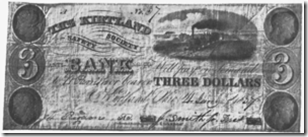
Joseph told his followers that it was because they were Mormons, but the truth was only one bank was allowed incorporation and the legislature was simply gaining control of a spiralling situation.
To get around the problem Joseph stamped his bank notes with the prefix anti and the suffix ing around the word Bank, creating the Kirtland Safety Society Anti-bank-ing Company. Now it was a quasi-bank, needn’t be incorporated and, if he could pull this off long enough to convince investors his problems might be solved.
The problem was he didn’t have the assets to back up the notes being printed. Bills were being paid, debts cleared and, for a fleeting fortnight, Kirtland was rich; but all on notes not worth their face value.
Joseph Smith confidently assured people he had $60,000 in the vaults and a further $600,000 readily accessible. The truth is he had $6,000 and access to not a penny more. He said there was no more than $10,000 in bills in circulation when, in fact, there was more than $150,000.
By January 27 merchants were refusing notes and the bills were streaming back into Kirtland. Joseph Smith redeemed the notes but soon realised a run on the bank would ruin him so stopped taking his own money. By February 1 every dollar of Kirtland money was worth no more than twelve and a half cents!
The truth is, the bank had always been illegal, the fixed penalty for the crime was $1000 with informers taking a share of the fine. Joseph Smith had enemies aplenty and it didn’t take long for one to swear a writ against him. By March 24 Joseph was on trial and ordered to pay the $1000 penalty, plus costs. The final reckoning established that the Mormon leaders owed non-Mormon individuals well over $150,000.
So, Lorenzo Snow-1889
In 1889 the Mormon Church had arrived at the same place. Church property had already been confiscated under the Edmunds-Tucker Act, the $4m temple had depleted church funds and there was another bubble, this time a railroad bubble, as well as overbuilding that would lead to the panic of 1893. Hundreds of banks would close across America, thousands of businesses go under.
Lorenzo Snow’s sermon was aimed at Mormons who might be tempted to follow the example of their founding prophet and speculate their church out of existence and themselves into “apostasy.” It is clear that he was not impressed by Joseph’s conduct, which he had witnessed first-hand. Nevertheless, he hawked around the “official” account which had been worked up over the years, and that exonerated Joseph and blamed “apostate” church members as well as some leaders.
Mormons were still facing financial ruin and would still need to resolve their financial difficulties. In 1899, now as president of the church, Lorenzo Snow toured the territories preaching tithing. You can read about that in a previous post. There the church’s subsequent change in fortune was described in this way:
“The church’s 1898 deficit of $1.25m became a net worth of $3.2m by 1904 and, while church leaders ascribed the changing fortunes of the church to God’s blessing tithe payers, it may have had more to do with the saints gaining full statehood and involvement in the rapid growth of the US economy from 1897 to 1907. Of course, the eyes of faith would have it otherwise, with the fortunes of the United States tied in with the fortunes of Mormons.”
When Mormons became American Mormonism became financially secure and Mormonism the American Religion.
Mike Thomas was a Mormon for 14 years, became a Christian in 1986 and for many years worked with Reachout Trust speaking and writing about Mormonism. He still researches Mormonism and occasionally posts his thoughts on Mormon issues at The Mormon Chapbook
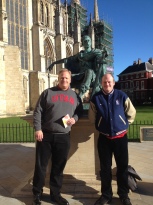
We had a great time last night teaching on Mormonism from a Christian perspective and having Russ East here in Middlesbrough, UK from Utah sharing his story. Thanks to all that came and for those that did not, please check out the podcast here. Or the recording below.

Hi there all this is just a quick update to let you know that we have Russ East currently staying in the UK for a few days. Russ runs our parent ministry Utah Partnerships for Christ. Today I recorded an interview with Russ that has gone onto our ministry podcast talking about what he does in Utah and why, you can find that here. Or just listen to it on this page below.
Also if you are in the Middlesbrough area tomorrow night on the 4th November. We are having an event at Melbourne House on Newport Road at 7:30pm where Russ will be sharing his story of leaving Mormonism and coming to Christ. If you would like more information please contact me, my details are on the left of this article. There is also a facebook event for this here.
thanks a lot
